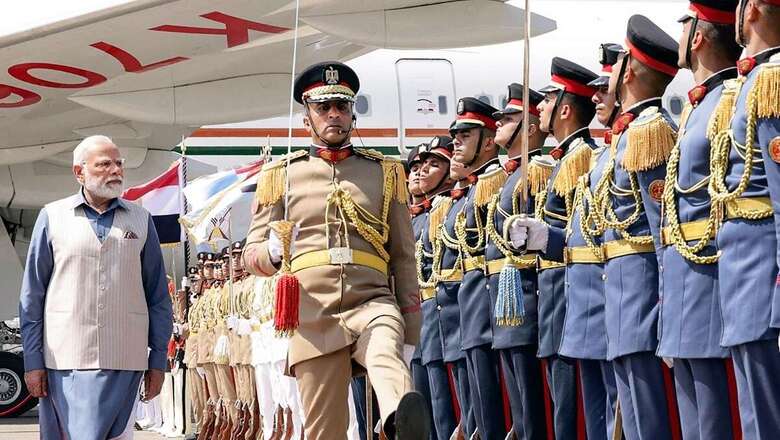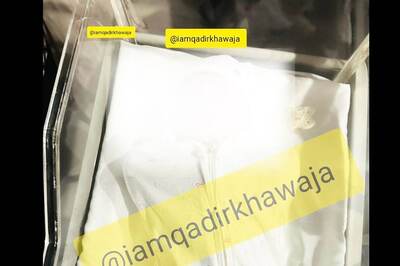
views
Prime Minister Narendra Modi reached Egypt on Saturday for a two-day tour after his high-profile state visit to the US. This is his first bilateral trip to Egypt.
Apart from Modi, four other Indian prime ministers have visited Egypt – Rajiv Gandhi in 1985, PV Narasimha Rao in 1995, Inder Kumar Gujral in 1997 and Mahmohan Singh in 2009 (for the NAM summit). Bilateral relations between India and Egypt were first established on August 18, 1947. The two countries share a history of cooperation in bilateral, regional and global issues.
Egypt is one of the most significant trading partners of India in the Arab-African continent. The partnership between the two countries is an important move in the direction of alliances with the Arab world.
The bilateral trade agreement between India and Egypt has been in operation since March 1978. High-level exchanges between both countries have continued after the 2011 Egyptian Revolution and bilateral trade has increased by more than five times in the last 10 years.
According to reports of the Indian embassy in Cairo, over 7 million Indians live in Egypt. From oil to infrastructure and telecommunications to consumer goods, over US$ 162 billion worth of goods and services are traded between India and the Arab world on a bilateral basis. India imports 60 percent crude oil from the Arab nation, while the Suez Canal economic zone (SCZONE) offers easy access to markets in Europe, Africa and the Gulf.
A total of 4.8 million barrels of crude oil are carried and transported through the canal every day, of which per day 5,00,000 barrels are transported to India. At present, Egypt controls 20 percent of the global container trade in the Suez Canal. With the help of Egypt, much of India’s external trade can be passed along the Suez Canal, Red Sea and Gulf of Aden.
According to embassy reports, the bilateral trade between India and Egypt in 2018-19 was US$ 4.55 billion, US$ 4.5 billion in 2019-20 and US$ 4.15 billion in 2020-21. After the pandemic, the bilateral trade expanded rapidly in 2021-22, accounted to US $ 7.26 billion, rising 75% from FY 2020-21. India’s exports to Egypt during this period accounted for US$ 3.74 billion, rising 65 percent over the same period in the 2020-21 fiscal.
The Directorate General of Commercial Intelligence and Statistics (DGCIS) states that bilateral trade has reached nearly US$ 4.4 billion, with US$ 2.9 billion worth of exports from India and US$ 1.5 billion worth of imports from Egypt to India during April 2022 to January 2023 of FY 2022-23. India emerged as Egypt’s sixth-largest commercial partner in the 2021-22 fiscal, as per the Egyptian Central Agency for Public Mobilisation and Statistics (CAPMAS).
At present, Indian investments are more than $3.2 billion in Egypt. The embassy report states, “Around 50 Indian companies invested in various sectors in Egypt with a combined investment exceeding US$ 3.2 billion. The Indian companies provide direct and indirect employment to approximately 35,000 Egyptians. Indian companies also executed projects in Egypt, in the energy and telecom sectors. Meanwhile, Egyptian investments in India are to the tune of US$ 37 million.”
The leading Indian IT company, Tech Mahindra established India’s first global delivery centre in Egypt in December 2022. Three other Indian companies – ReNew Power, ACME and Ocior Energy – signed agreements worth US$ 18 billion in the domain of ‘green hydrogen’ in 2022.
While speaking to one of the Indian media houses, Egyptian ambassador Wael Mohamed Awad Hamed said, “Green hydrogen is the fuel of the future. I think we are building a very strong partnership in the energy sector and it’s going to bring better opportunities for our economic relationship.”
Looking at the food security issue on April 14, 2022, Egypt included India in the list of accredited countries that can supply wheat to the country by ending a long-pending non-tariff barrier. Though the ban on wheat exports in India posed a difficulty in concluding the shipment, 80,000 MT of wheat were shipped to Egypt till June 2022.
Egypt is the world’s largest wheat importer. Inflation hit the country at a five-year high of 21 percent, leading to price rise of commodities and daily-use items, including milk and basic food items, as a result of the pandemic and Russia-Ukraine war.




















Comments
0 comment